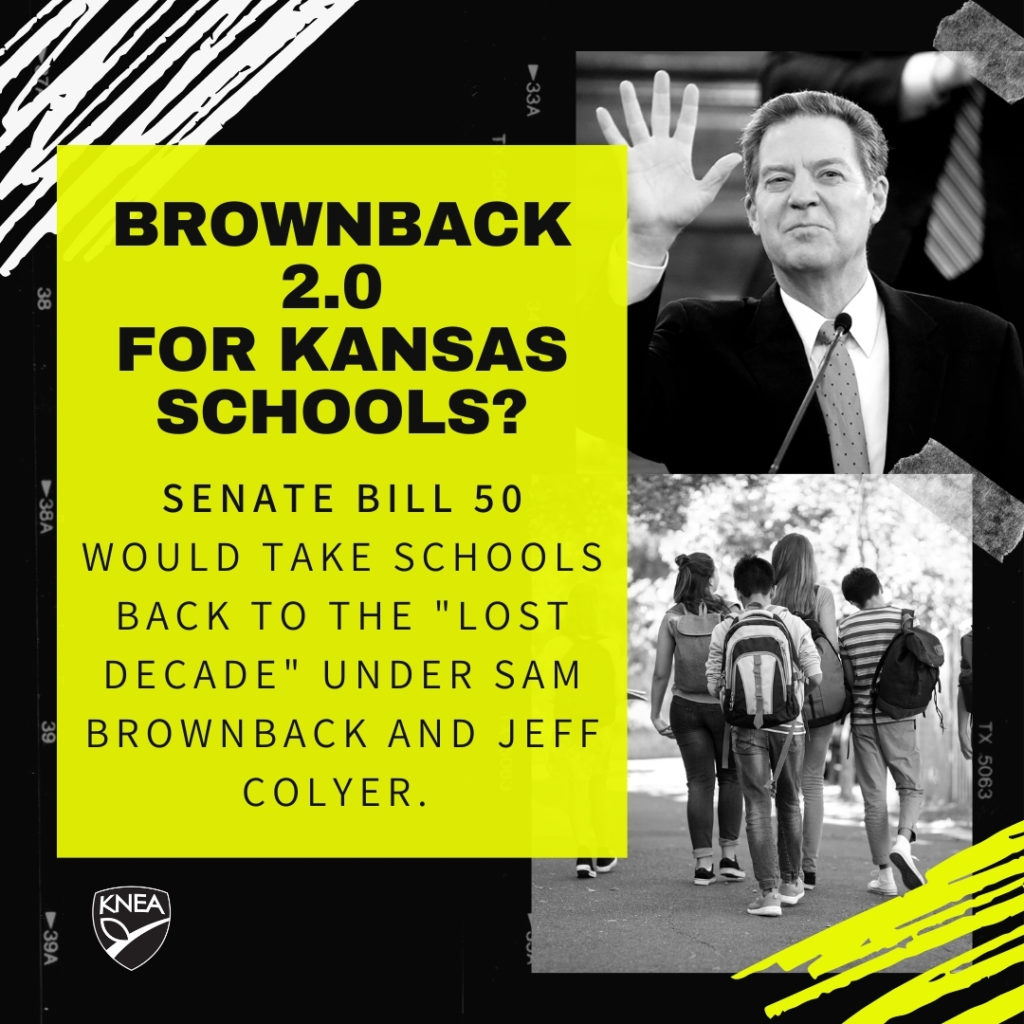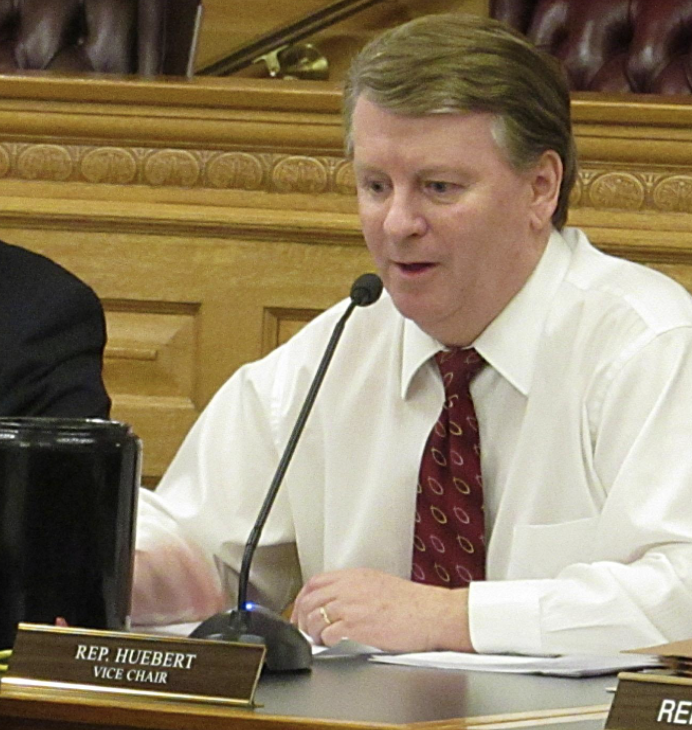Vouchers
There were several attempts to expand Kansas’ current voucher program (tax credit scholarships) and create a radical new voucher program coming from Kristey Williams (R-Augusta) K-12 Education Budget Committee.

First was HB 2068, expanding the current tax credit voucher program to make all free and reduced lunch students in any K-12 school eligible for a voucher. The current program is restricted to free lunch students in the 100 lowest performing elementary schools. While HB 2068 never moved forward, its’ provisions were subsequently rolled into HB 2119 and taken to the House floor.
A bill identical to HB 2068 was introduced in the Senate (SB 61) and had passed the full Senate on a vote of 23 to 14.
HB 2119, as originally introduced, was a radical new voucher program called “education savings accounts” in which a student’s base state aid would be put into an account in the Kansas Treasurer’s office where a parent could use the funds to pay for private school tuition. HB 2119 also included Governor Laura Kelly’s education budget which honored the Gannon decision.
HB 2119 barely passed the House on a vote of 65 to 58, was referred to the Senate Education Committee and became the House position for conference negotiations on the K-12 budget.
What came out of the conference committee was HB 2119 with a few things Senators liked, all rolled into a conference committee report (CCR) on SB 175.
CCR SB 175 was adopted by the House on a vote of 64 to 59 but failed in the Senate twice on tie votes – 19 to 19 the first time and then on reconsideration the next day, 20 to 20.
Returning to conference, the education savings accounts voucher program was stripped out and the expansion of the tax credit voucher program was expanded to include students who qualify for reduced lunch programs in K-8; whereas previously, only those who qualified for free school lunch were eligible. The cap for this program remains $10 million. The new CCR – HB 2134 – was ultimately adopted as the school finance bill on a vote of 35 to 4 in the Senate and 107 to 9 in the House. While this appears to be an acceptable compromise, we should remember the attempt to grow voucher programs and siphon dollars away from public schools toward private schools remains one of the highest priorities of the deeply conservative majorities in the Kansas Legislature.
Big tax cuts are back
Large tax cuts for multi-national corporations have been bandied about for several sessions but either did not pass or were vetoed by the Governor.
This year, corporations made another run at cuts but these cuts were more modest when compared to those we’ve seen in the past. They appeared in a number of bills during the session but, in the end, it came down to Senate Bill 50.
The CCR on SB 50 contained the corporate tax cuts but sought to sweeten the deal by adding in one tax increase and a quarter teaspoon of sugar for individuals.
The tax increase is a new requirement on online market place facilitators (they manage internet sales for various businesses) under which they must collect and remit Kansas sales taxes once they have sales in Kansas of $100,000.
For individual income tax filers, they raise the standard deduction by $500 and grant permission to itemize deductions on your Kansas return even if you can’t on your federal return. Very few Kansas taxpayers actually itemized when it was widely available and most who will benefit form this new provision would be higher income individuals. Along with the standard deductions, this bill is expected to give about $26 per year in tax relief to the average Kansan.
CCR SB 50 was adopted by both chambers and then vetoed by Governor Kelly. Both chambers subsequently overrode her veto.
Curriculum and Assessment
Under the Kansas constitution, authority for supervision of the education interests of the state rests with the state Board of Education. The state board and local boards are in charge of decisions about curriculum and assessment. Of course, that doesn’t stop the conservative majority in the legislature from making its’ annual attempt to usurp that authority.
This year it came in the form of Rep. Steve Huebert’s (R-Valley Center) perennial bill to micro-manage curriculum and assessment in high school civics and government courses. House Bill 2039 would have mandated a high stakes civics test for credit in high school civics classes. The test he proposed? The U.S. Citizenship test – a multiple-choice American trivia test with questions entirely unrelated to civic engagement. His bill was opposed by the state board, KASB, KNEA, USA/KS, the High School Social Studies Teachers Association, as well as many parent advocacy groups and local school districts.
To make matters worse, Rep. Adam Thomas (R-Olathe) added a provision to HB 2039 mandating completion of a financial literacy course for high school graduation, again, seeking to usurp the authority of the state board.
The bill passed both chambers but was vetoed by Governor Kelly precisely because it was usurping the authority of the state board and local boards of education. There was no attempt to override the veto so the bill did not become law.
Another curriculum management bill, HB 2089, would have required the state board to adopt standards for firearm safety programs used in schools that aligned with the NRA’s Eddie Eagle firearms safety program. Essentially, the legislature was endorsing an NRA program over any other firearms safety program a school might use or, in fact, be using now. There was no mandate in the bill that schools offer a firearms safety program. This bill also passed both chambers and was vetoed by Governor Kelly. As with HB 2039, there was no attempt to override her veto so the bill did not become law.
Educators and patrons would do well to remember that every attempt by the legislature to meddle in curriculum decisions often results in several unanswered questions and unintended consequences. For example, who pays for the mandates? For every piece of special-interest mandated curriculum, other courses and programs are squeezed out like foreign languages, arts education, and other electives that engage students. More of these attempts are sure to be given voice in the future.
More guns on campus
In just two days, more than 260 shootings across the United States killed 94 people and injured 236, according to data from the Gun Violence Archive. They happened in 37 states, from Washington to Florida and from Arizona to New Hampshire, shaking both big cities and small towns. And they account for only a 48-hour snapshot of gun violence in America.
But the weekend illustrates an alarming trend, said the archive’s founder, Mark Bryant: The number of shootings, including those that kill or injure several people, appears to be on the rise.
The Washington Post
Despite the alarming and constant reporting of ever more shootings, the Kansas Legislature seems determined to get as many guns out in public as possible. This session was no different with the passage of HB 2058, a bill creating a new concealed carry permit for individuals from 18 to 20 years of age. Under current law one must be 21 to be eligible for a permit.
Over the years, Kansas lawmakers have bowed repeatedly to the demands of the NRA to loosen any and all gun restrictions. There is law on the books that prohibits college campuses from restricting firearms unless they put security at every entrance to buildings on campus. The cost of metal detectors and security guards to secure every building is prohibitively expensive, essential denying our colleges and universities the right to restrict weaponry.
Now with the passage of HB 2058, nearly every individual on a tech college, community college or university campus in Kansas is eligible to carry a concealed firearm into classrooms and dorms making those campuses decidedly less safe.
Conservatives in the Kansas Legislature have long bowed to the pressure and deep pocketed contributors of the National Rifle Association – even when public sentiment continues to lean more towards the rights of citizens to live without fear of being a victim of gun violence. As more and more evidence has come to light regarding the unabashed greed, abuse and malfeasance perpetrated by NRA leaders for decades, we have to wonder when our legislators will reject their NRA overseers and stand with citizens and those responsible for ensuring public safety.
The Governor vetoed the bill but both chambers voted to override the veto so it becomes law.
This year’s LGBTQ attack – Transgender girls
The culture wars have struck hard this year across the country with this year’s issue being what to do about transgender girls. Multiple states have proposed and many have passed bills marginalizing transgender youth. These range from prohibitions on medical treatment to the Kansas bill which prohibits transgender girls from participating in girl’s sports teams from kindergarten through college.
The so-called “Fairness in girl’s sports act” would require all sports be designated as boys, girls, or coed and that transgender girls would be forced to participate only on boys teams. The bill even started out with genital checks to determine whether a student could participate; thankfully, that was removed in committee in Kansas.
The Kansas State High School Activities Association (KSHSAA) already has policies to address the participation of transgender students in sports but some in the legislature were apparently disturbed the policy was not an outright ban on participation. KSHSAA reports there are a total of five transgender athletes in Kansas high schools currently.
There were several issues raised about the bill. First was the issue of LGBTQ discrimination and the bill was essentially codifying the marginalization of transgender youth who are already at a higher risk of depression and suicide because of bullying and alienation. A second argument against the bill was an economic argument. Local chambers of commerce testified passage of the bill would interfere with the ability of businesses to attract young professionals to Kansas and the reaction of the NCAA and FIFA would result in the loss of tournaments in Kansas – some of which are currently scheduled – and subsequently millions of dollars in economic benefit. Finally, there was a legislative argument about a bill that declares studies and articles that agree with the bill’s sponsors as legislative findings of fact while ignoring alternative viewpoints.
It would appear that “cancel culture” is alive and well in the conservative caucus. In this most recent example, it’s simply disguised as “competition fairness.” Despite their underlying efforts to “cancel” trans youth, it hasn’t been lost on many who opposed this bill that those who have fought so hard to pass it were quick to overlook and disregard the alarming rates of suicide and self-harm among marginalized teens like those at the center of this attack. Further, it underscores how their purported pro-life agenda seemingly stops short when there seems to be an opportunity to push certain kids even further to the margins.
The bill started in the Senate as SB 208 sponsored by Sen. Renee Erickson (R-Wichita). In the Senate, the education committee removed the section on genital inspection as a means of determining eligibility for a team and sent it to the full Senate where it was approved on a vote of 24 to 10 with five senators passing. The House then referred the bill to the Committee on Education. It was scheduled for a hearing but that hearing was canceled and the bill never advanced.
Not to be deterred, the proponents of the bill took it into an education conference committee on SB 55, a bill dealing with healing arts schools that would let Cleveland University practice chiropractics on campus. That bill was gutted and the contents of SB 208 were inserted into the shell of the bill. Democrats on the conference committee – Sen. Dinah Sykes (D-Lenexa) and Rep. Jerry Stogsdill (D-Prairie Village) – refused to sign the conference committee report.
After an “agree to disagree” was adopted by both chambers, the bill could be taken up on the floor and it passed the House 76 to 43 and the Senate 26 to 11. Governor Kelly vetoed the bill.
A veto override motion was made in the Senate but that motion failed to get the 27 votes needed to override the veto. The veto was sustained on a vote of 26 to 14. Kansas successfully fought off this discriminatory legislation.
Should local school boards be allowed to make decisions?
Back last summer, the legislature worked hard to strip Governor Kelly of the ability to enact and enforce executive orders to control the spread of COVID. The Republican legislature insisted that decisions were best made on the local level considering local conditions.
Of course, that only lasted until local authorities made decisions that were not the decisions Republican legislative leaders would have made.
Local school boards, working with their counties, cities, and local health officials and balancing the health needs of students and school employees, made some difficult decisions and most of those decisions had to do with whether masks would be mandated, whether school would in-person, remote, or hybrid, and how to handle sports participation and spectators.
A lot of those decisions were tough to make and people were bound to be disappointed. Frankly, everyone would prefer full-time in-person teaching; everyone would prefer not to wear a mask; and everyone wanted a full schedule of sports, band, and choir with stands full of fans. And some of those people complained loudly to legislators and at school board meetings.
That’s when Republican leaders, who once insisted all decisions should be made by local officials, decided they would mandate decisions to those local communities.
This took the form of two proposals.
1. Forced reopening of all schools, regardless of the pandemic and its risks to students and adults.
One idea was to put school boards through a living hell of official complaints, public hearings, and possible court proceedings if they didn’t end their restrictions. This took the form of Senate Bill 235 by Senate President Ty Masterson (R-Andover). His bill, introduced on February 12, would have required all public schools have a full-time, in-person option for any student who wanted it by March 26. Further, this bill would have applied to all school years going forward – essentially, no matter what ever happened, a school would be required to have a full-time, in-person option. If a tornado destroyed your school, you would still have to have a full-time, in-person option. Another potentially more deadly pandemic? You must have full-time, in-person learning as an option.
The bill was sent to the Senate floor on March 3 where it was approved on a vote of 26 to 12 and sent to the House. The House K-12 Education Budget Committee sent it off to the House floor where it was defeated on a vote of 55 to 69.
But of course, that was not the end. The House K-12 Budget Committee took Senate Bill 63 which expanded the availability of free ACT, Pre-ACT, and ACT WorkKeys tests to private school students, gutted the bill and inserted a new mandatory opening requirement but one that was much better. First, the new House Substitute for SB 63 called upon schools to have the full-time, in-person option by March 31 but it also limited it to this school year only thereby allowing local boards to respond to emergencies in the future. This is the version that ultimately passed and was signed by the Governor on April 5 by which time all schools did have a full-time, in-person learning option.
2. Squeaky wheels get greased, because conservatives in Kansas have shown that local control really means, “legislative leaders will control you at the local level.”
And this brings us to Senate Bill 40 by the Committee on Agriculture and Natural Resources, an act concerning agriculture; relating to the Kansas Department of Agriculture Division of Conservation.
Or so we thought.
This agriculture bill was passed by the full Senate on a vote of 37 to 0; they loved it. It was amended somewhat by the full House and passed on a vote of 123 to 1; they loved it, too. But because they both passed different versions it was sent to an agriculture conference committee to talk about the differences.
But then something mysterious happened. It was announced the members of the House and Senate Judiciary Committees would replace the members of the House and Senate Agriculture Committees on the conference committee. Strange, isn’t it?
The conference committee met and presto-change-o! The 29-page agriculture bill became a 15-page bill amending the Kansas Emergency Management Act and included a section allowing any parent, student, or employee of a school district to challenge any restriction put in place by a school board. The board must hold a hearing within 72 hours and issue a decision within seven days. And if the complainant doesn’t like the decision, they can proceed to court.
So starting on March 26, complainants have been tying up school boards around the state in hearings on repealing a mask order that would likely only have lasted for about 45 to 50 more school days anyway. Yes, tying up the time of school administrators and board members like this seems like a great use of resources to legislative leadership.
But that’s the way the legislature works. And in this case, the squeaky wheels got all the grease they wanted.







